Pomchies are tiny dogs with larger-than-life personalities. These small, intelligent hybrids will often be found playing with toys or snuggling on their favorite human's lap.
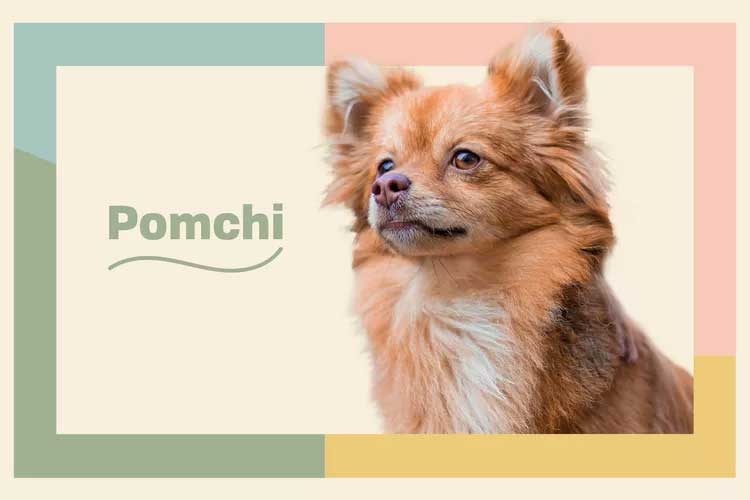
Pomchi Overview
| OFFICIAL NAME | Pomchi |
| COMMON NAME | Pomchi |
| PET HEIGHT | 6 to 9 inches |
| PET WEIGHT | 3 to 7 pounds |
| LIFESPAN | 12 to 15 years |
| GOOD WITH | cats, families, seniors |
| TEMPERAMENT | outgoing, playful |
| INTELLIGENCE | high |
| SHEDDING AMOUNT | normal |
| EXERCISE NEEDS | low |
| ENERGY LEVEL | active |
| VOCAL LEVEL | frequent |
| DROOL AMOUNT | low |
| BREED GROUP | hybrid |
| BREED SIZE | small (0-25 lbs.) |
| COAT LENGTH | long, medium, short |
| COLORS | black, blue, brown / chocolate / liver, cream, fawn, gold / yellow, gray, white |
| PATTERNS | bicolor, black and tan, blue and tan, liver and tan, tricolor |
| OTHER TRAITS | apartment-friendly, easy to groom, easy to train, good for first-time pet owners, strong loyalty tendencies |
The Pomchi is a hybrid dog that blends the small-but-mighty attributes of the Pomeranian and the Chihuahua. These toy breeds combine to create a pint-sized pup, but they still have big personalities and are known for occasional willful streaks. If you're devoted to training and socializing your Pomchi puppy, they will make a loyal companion.
These hybrid pups are known by a few different names, too, including the Chipom, Pomahuahua, and Chiranian (the title favored by the American Canine Hybrid Club).
Appearance
The best things come in small packages, and the Pomchi is proof. No matter which parent your Pomchi takes after, they will weigh less than a gallon of milk, making them a perfect on-the-go dog. Chihuahuas are known as the smallest dog breed in the world, weighing just 6 pounds at their heaviest, while the Pomeranian can weigh up to 7 pounds.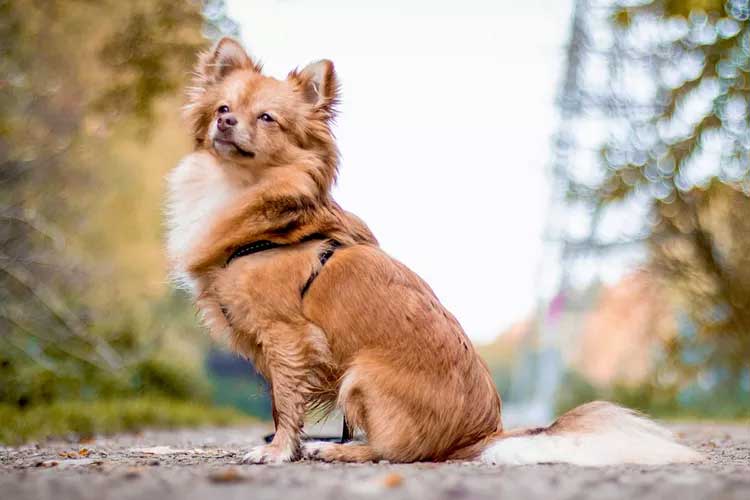
The Pomchi stands between just 6-9 inches in height, so they are known for getting underfoot when excited. Early training will help your Pomchi learn not to wander beneath their human's feet (especially while you cook), and help both parties avoid injuries.
The Pomchi's coat often comes in a range of colors, just like their parents-imagine everything from cream Pomchies to black with a variety of color combinations in between. Just like their fun-loving personalities, every Pomchi's coat has a little bit of character. Depending on his parents, his coat can be long and fluffy or short and thin. But no matter their coat, these dogs are easy to groom with regular brushing using a soft brush.
Temperament
Pomchies inherit traits from two bold, charming, and highly intelligent breeds. These tiny dogs love to be close to their preferred humans, and they provide a lifetime of entertainment alongside their sometimes sassy attitudes. Though small, the Pomchi is an active dog that is eager to learn new tricks, play, and accompany you on outings.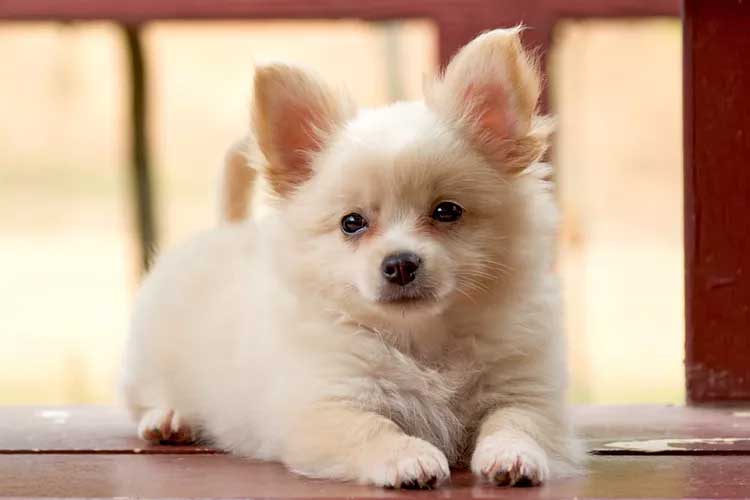
While they adore their humans, Pomchies can be jealous when their owner pays attention to other animals, people, or anything that isn't them. Early socialization during puppyhood will help them be more accepting of strangers.
Joan Mayer, CPDT-KA, CBCC-KA, recommends her clients at The Inquisitive Canine introduce smaller dogs to larger puppy peers through a reward-based class so a professional trainer is present during the initial interactions. Mayer, who owns a Pomchi mix of her own named Ringo, recommends introducing these petite pups to other small dogs first, then expanding to larger dogs who are mature and have a good demeanor with small animals.
"Find people who are in a similar situation as you when it comes to socializing smaller dogs," Mayer says. "Maybe you have friends with dogs, you're taking your dog to training classes, or ask your veterinarian if they have other clients with dogs who would want a puppy play date or walk … you want the dog to have as many positive responses and experiences as they can."
Thanks to their innate intelligence, the Pomchi is usually quick to learn with the help of positive reinforcement training. While some are motivated by treats, others are driven by affection and praise for good behavior.
Living Needs
With his compact size, the Pomchi lives seamlessly in most spaces-including apartments, tiny homes, and mobile homes. These fearless pups can sometimes forget their own fragile nature. So, despite their bravado, they should be introduced carefully to children, dogs, or other pets so they aren't accidentally injured.It is important to make sure adults and children give Pomchies space and allow them to approach humans on their own terms. Again, they can be nervous or suspicious around new people at first.
"Each dog should be viewed as an individual," Mayer says. "In general, what I've observed is that the general public tends to treat small dogs differently than large dogs. People are more likely to approach them because they're tiny. Little dogs-because they've been grabbed more or approached more because they're cute and small-might start to get more defensive."
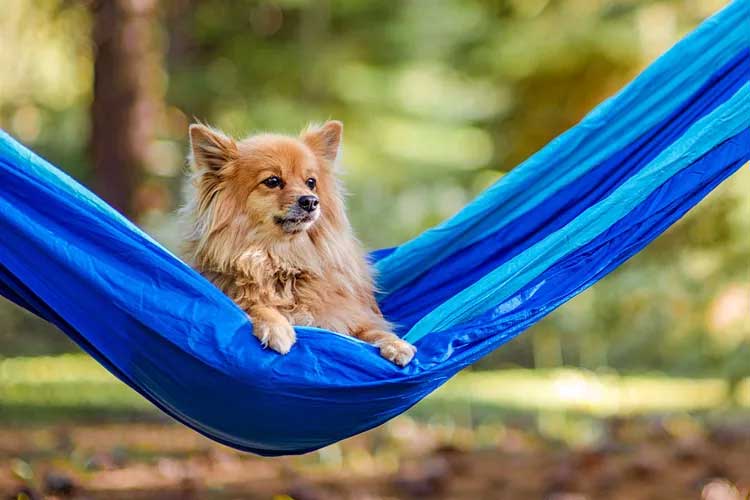
In small spaces, these tiny dogs can also have a tendency to get underfoot, especially in the kitchen. Owners can prevent injuries for humans and pets alike by having a small dog bed set aside and training their Pomchi that the bed is their "spot" in the kitchen.
Once comfortable with his surroundings, a Pomchi will love showing off tricks and snuggling in laps. He can suffer from anxiety when left alone for prolonged periods of time, so owners should be prepared to take their dog with them whenever possible. They are inquisitive hybrids who love new experiences once they feel safe with the people around them, so carry them with you as you run errands!
Care
A Pomchi will choose toys and games over exercise most of the time. Pomeranians and Chihuahuas can really only manage 20-30 minutes of walking at a time, and they do not need much exercise. In addition to playing with your Pomchi (most love squeaky toys and other interactive games), make sure to brush them regularly.
Keep in mind that Pomchies have sensitive skin and thin coats, so owners will want to use a soft bristle brush to keep their coats clean. Like most small dogs, Pomeranians and Chihuahuas can be prone to teeth problems. Their tiny teeth need to be brushed regularly to avoid dental disease. Tasty dental chews and regular dental cleanings will help, too. And as with all dogs, Pomchi parents need to keep their pup's nails trimmed.
Pomchi are known for their frequent "alert barking," a way for dogs to inform their owners that something is happening-whether that's the arrival of the mailman, a thunder clap, or a squirrel scampering into the backyard. Consistent training will help your Pomchi learn what's worth a bark and when to be quiet.
Health
The Pomchi's lifespan stretches 12-15 years, making them a companion that will likely be by your side for a long time. As a hybrid breed, the Pomchi is likely to inherit the health issues most commonly found in Pomeranians, Chihuahuas, and other toy dogs. Both the Pomeranian and Chihuahua are fairly healthy breeds, but there are problems owners should keep an eye out for.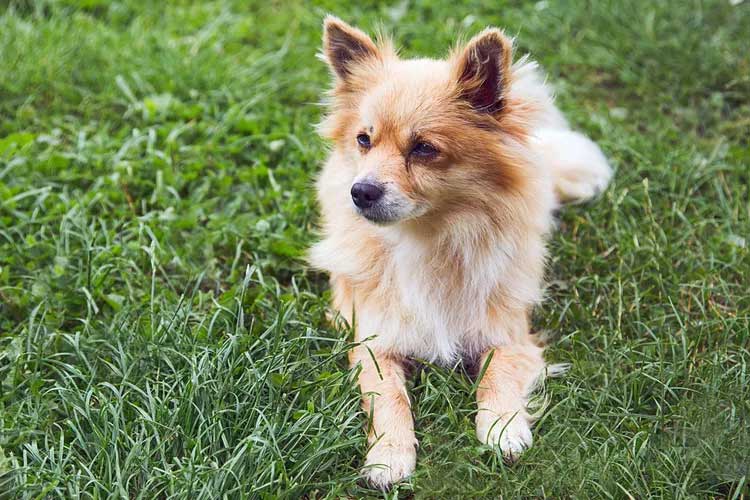
Stacy Choczynski Johnson, DVM, consultant for Pumpkin Pet Insurance, recommends potential owners talk to breeders about diseases that are present in the maternal and paternal lineage with a specific focus on the problems that appear commonly in both parent breeds.
"When I evaluate the risk for inherited diseases in mixed breeds, I look at diseases that show up in both sides of the family," Johnson says. "For Pomeranians and Chihuahuas, we want to be on the lookout for patellar (knee cap) luxation, valve degeneration in the heart, tracheal collapse, and periodontal disease, which is overrepresented in both breeds."
Pomeranians and Chihuahuas are also more prone than other breeds to develop epilepsy and have seizures.
Most toy breeds are more susceptible to joint issues as they age, including Legg-Calve-Perthes Disease and hip dysplasia. While significant, these problems can often be addressed with a veterinarian-approved hip and joint supplement. Pomchies can also develop a range of eye problems, so it's important to keep your pup's eyes clean and go to your veterinarian regularly for check-ups.
History
Like many hybrid dogs, the Pomchi's origin is largely a mystery of the designer dog era. Hybrids are not registered by the American Kennel Club as official dog breeds, so their history is not well-documented. The most likely explanation for Pomchies is that breeders sought to combine two toy breeds to create an even tinier pup with the best traits of their parents.While the history of the Pomeranian-Chihuahua mix is unknown, his parent breeds have long histories as companion dogs. The Chihuahua either descended from Central or South American dogs of the 9th century, or they were descendants of Chinese dogs who made their arrival to the Americas via traders. The Pomchi's other parent pup, Pomeranians, came from current-day Poland and western Germany. No matter the true origin, these itsy-bitsy companion dogs have been beloved wherever they land.
Both the Pomeranian and the Chihuahua are desired breeds in other newly popular hybrids, including the Chiweenie (a Chihuahua-Dachshund mix) and Pomsky (a Pomeranian-Siberian husky mix).
There is no official breed standard for these hybrids, which means not every designer dog is held to the same lineage or health standards as purebreds. This makes it especially important for hopeful hybrid owners to avoid unlicensed breeders or a commercial dog breeding facility. Here are some red flags to watch out for when searching for a hybrid dog so you can avoid a puppy mill scam:
Avoid breeders who will not allow you to meet the parent dogs or will not disclose information about the grandparent dogs
Avoid breeders who will not allow you to meet the puppies on-site at their facilities-it's important to make sure they're raised in a clean facility that is not overcrowded.
Only work with the breeders who will share their veterinary health screenings for both parent dogs and puppies.
Avoid breeders who are willing to let you take home a puppy who's less than 8 or 10 weeks old.
Fun Facts
Actress Sofia Vergara brought home a Pomchi named Bubbles in 2021 but was surprised to find that her pup took to her husband Joe Manganiello more than her, showcasing the breed's loyalty. Vergara told The Tonight Show, "She was supposed to be my dog. She arrived to the house and I don't know, she thought she was for Joe and that's all she wants to do."Celebrity chef Katie Lee Biegel of Food Network's "The Kitchen," is the proud owner of a sweet Pomchi named Gus, whom she adopted in 2017 after forming an "instant connection." His adventures can be found on his Instagram, @littlebuddygus.
Two Pomchi siblings are the stars of the popular TikTok account @puppysongs.